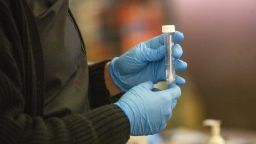A shot of the latest Covid-19 vaccine can help cut the chances of getting a symptomatic infection by half, early data from the US Centers for Disease Control and Prevention suggests.
Vaccine manufacturers updated their formulations to target the Omicron variant XBB.1.5, which was the predominant circulating strain for much of 2023. But the new CDC data shows that the latest vaccines are similarly effective against JN.1, which has been causing most Covid-19 infections in the United States since late December.
For this analysis, researchers analyzed trends among more than 9,000 adults who were tested for Covid-19 at Walgreens and CVS Pharmacy locations between mid-September and mid-January. For some of the patients with positive tests, the researchers were able to test for a specific “quirk” in the virus that allowed them to differentiate between specific strains.
Overall, the updated Covid-19 vaccines provided 54% protection against symptomatic infection among immunocompetent adults who were recently vaccinated compared with those who did not receive an updated vaccine, according to the report published Thursday by the CDC.
“Everything from this study is reassuring that the vaccines are providing the protection that we expected,” said Ruth Link-Gelles, lead author of the new study who heads the CDC’s vaccine effectiveness program for Covid and RSV. “While we don’t have an estimate of vaccine effectiveness specific to immunocompromised people, the fact that the vaccine is working in the general population provides, I think, reassurance for the whole population.”
Generally, the goal of the US Covid-19 vaccination program is to prevent severe disease, but measuring vaccine effectiveness against symptomatic infection offers an extra early look at how well the vaccines are working. It’s often the first estimate that’s available because more people get an infection than are hospitalized, so there’s a large enough population to study sooner, Link-Gelles said.
“That’s a really nice feature of this analysis, that it checks that box: Yes, the vaccine is working, it’s providing protection, it’s providing protection for JN.1, which is the current most common variant,” she said.
The latest Covid-19 vaccines have only been available since September, after a recommendation from the CDC’s independent vaccine advisory committee and official signoff from the agency and the US Food and Drug Administration, so this analysis was only able to track trends through about four months after vaccination.
Based on the trends from Covid-19 vaccines, it’s expected that protection from the latest vaccine will wane over time. A very slight “hint” of that was observed in the new study, Link-Gelles said. But the CDC plans to continue to monitor the effectiveness of the latest vaccine, and additional analysis at later dates will help determine how well vaccines are working to prevent severe disease and how quickly protection may wane.
Get CNN Health's weekly newsletter
- Sign up here to get The Results Are In with Dr. Sanjay Gupta every Tuesday from the CNN Health team.
The US doesn’t have a system in place to track Covid-19 cases, but wastewater data suggests that Covid-19 continues to circulate at high levels in the US and there are still tens of thousands of Covid-19 hospitalizations and hundreds of deaths each week. During the week ending January 13, there were nearly 31,000 Covid-19 hospitalizations and more than 1,800 deaths, according to CDC data.
Still, only about 1 in 5 adults and 1 in 9 children have gotten the latest Covid-19 vaccine, which is recommended for everyone ages 6 months and older, the CDC estimates.
By comparison, nearly half of adults and children have gotten the flu vaccine this season. And a flu season where the vaccine matches the circulating strain with 50% effectiveness would be considered a really good match, Link-Gelles said.
“There’s never a bad time to get a Covid vaccine,” she said. “Even with relatively low levels of hospitalization right now … that extra protection is going to go a long way.”

